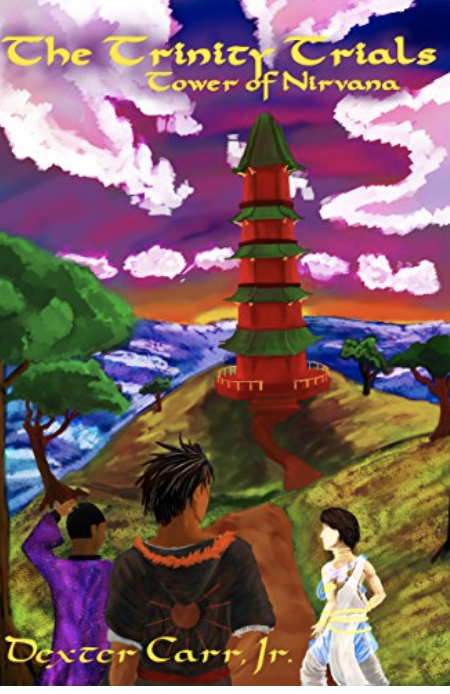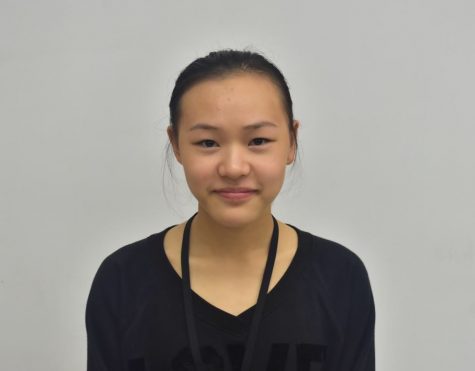A Conversation with ERHS Alum Dexter Carr Jr.
March 8, 2019
Dexter Carr Jr. is the author of Tower of Nirvana, the first installment in his 5-book series, The Trinity Trials. He is an alum of Eleanor Roosevelt High School (class of 2009), and went to Penn State University for both his bachelor’s and master’s degree (class of 2013 and 2017). Tower of Nirvana, his first published work, is now available on Amazon and the Barnes & Noble website.
So, what inspired you to write The Trinity Trials?
DC: Well, I’ve always been a writer. Back when I was in elementary school, I used to do this contest called the Write-a-Book Contest…I don’t know if they still have that, but I took part in that a lot when I was younger.
Particularly with this series, when I was in college, a friend of mine was also a writer, and he kind of inspired me to do it…I was thinking about it, and I’ve always loved mythology growing up, loved the different ideologies behind it—not just with mythology, but with religions. And I’ve always just loved fantasy. And that’s kind of what drew me to, hey, create a story that combines all of that and allows me…to learn even more. What I’ve done with this first book is I have a lot of research that goes into [finding] the inspirational material, so I get to learn more about what I’m writing about to create the world [in the book].
Can you give a brief synopsis of the book?
DC: The Trinity Trials basically follows three main characters: Demetrius, Mathias, and Eous Lucentes. So, they have been chosen to become this universe’s equivalent to, or [the book’s] version of, the Holy Trinity. And they are basically tasked with maintaining the balance among all the people of different realms…to be that middle person. And the story follows them as they go on their journey to become the Holy Trinity. But in order for them to gain the title, they have to go through what’s called the Trinity trials. So [the series] follows them through each of the [five] trials.
Have you written all five books yet?
DC: Not yet—I’ve mapped out all 5; I’m working on writing the second one right now.
Can you describe what your writing process is like?
DC: After I…figure out exactly what I’m going to write, I first outline the entire story. Like, just like how I was taught in school, like when you’re writing a paper, do your regular outline. That’s kind of what I do with the whole story, the beginning to end of that particular book. Then I start creating the characters, and what new characters should, or would, be introduced to progress the story. From there I start world-building, and with that, there’s a lot of research involved. For this particular book, [a lot] of the research is on different theologies and where they’re from—mythos, religions, things like that…and [this book] focuses on contrasting all the Abrahamic religions…with Hinduism. And I research into those things to learn more, and use what I learn to create the worlds that spawn from those ideas. After I gain the research needed, then I’ll start writing, and putting characters in that world. And kind of the process I do it, is I try to picture [what’s] happening, and it’s as if I’m just the person documenting everything that’s happening. So it’s like I’m watching it happen—
Like you’re watching a movie?
DC: Exactly, and I’m just basically dictating and recording everything that happens…looking at the scenes, trying to make sure that I capture the moment, so I can draw people into the world, so when they’re reading, the words come to life.
Why did choose the Abrahamic religions and Hinduism in particular, and not like, Buddhism?
DC: That answer would more so focus on the order I chose [the books to be in]. So I guess the better way to answer would be to talk about the order. The main religion, or ideologies, I’ve chosen would be the Abrahamic religions, Hinduism, Shintoism, Taoism, and Greek pantheon and philosophy. So there’s an order of how these individuals go through the trials, and the lessons they have to learn, and I thought of what ideologies I could use that would best align with what they’re learning, or how they go about learning it. That’s kind of the focus of the order. For Tower of Nirvana: You hear “nirvana,” you think of enlightenment. So the first step is to gain enlightenment, somehow. That’s the driving force of this first book.
How would you describe your writing style?
DC: My writing style, I would say, is very realistic, like you could see things actually happening…my book is very dialogue-heavy, dialogue-driven.
The emotion comes from the dialogue of the characters, and when you read the conversations they have, you feel their emotions, or that’s the aim I have.
You say this book is heavy on dialogue; have you ever tried playwriting or screenwriting, by any chance?
DC: Yeah, so I wrote this book particularly so it could potentially become its own TV series or whatnot, or video game, I don’t know—because essentially that’s what people get when they read it, the feeling that, oh, this could easily be translated into a movie. Because how I describe everything is basically like if you’re writing a screenplay.
What was the publishing process like for you?
DC: Well, for me, I decided to self-publish first. Self-publishing is relatively easy; I did mine through Amazon and Barnes & Noble. The process is very simple—the hardest part is more so the formatting, because each [company] has its own particular way [they want] you to format the book, in terms of font size, alignment…I gotta make sure that I have that well done, so [when] they print [the book], it will fit within their guidelines.
Is there a reason you chose to self-publish instead of, like, query literary agents?
DC: I chose to do that, first. I do plan on going to traditional, but I chose to do it first because I wanted to have two or three books under my belt, and also because I wanted to prove that I don’t need their editorial…their control over the content, over how I write, what they would rather not have me talk about, because that’s a really big thing, censoring…like, Scholastic, they have guides on what you can or can’t have in your books, or even in like…a lot of my influences come from manga, and even with them, some of their publishers…try to force their vision, or a mold of the vision of the author, on the author. Basically, my whole goal is to get to the point where they’re like, “Hey, it works, we like it.” I just need [them] to help me promote it and push it out.
How are you currently promoting your book?
DC: A lot of it is word-of-mouth. I also have a Facebook fan page for it, so I try my best to interact with people out there who want to learn more about the book. I’m always open to spreading the word that way, answering questions, things like that.
You said that some of your main influences come from manga. What influences you about that genre?
DC: The writing style, particularly. How [the authors] develop characters. The plot. One of the things I respect about manga a lot, manga and all its authors, is the deep-rooted plots. When you think you peel it back, it goes deeper, and you just keep on peeling layers, and sometimes it can become convoluted—I mean, I can understand that. But I enjoy that because it shows the author took the time to tie everything together. And the character development of some of the characters, is what I really enjoy about [manga].
That’s what I want for my series when I write. Everything ties back to something.
Besides writing, what are some of your interests?
DC: I love to learn. I love to learn new things. And that’s what this book allows me to do. Like, I might come from a Christian background, but there are certain things about the Abrahamic religions that I didn’t really know of, or how similar all of them are, even though they’re technically different. With Hinduism—I didn’t really know that much about Hinduism besides some of the gods, or being able to recognize them. But looking into it for the book, I was so taken aback by the fluidity and flexibility of Hinduism as a whole; it doesn’t just cater to one way of thinking. The whole point of it, the underlying message of it, is more so about enlightenment, being one with the self, and that’s one of the things that I appreciate.
One of the things you commented on earlier about why I used Hinduism instead of Buddhism—it’s not the fact that I didn’t use Buddhism, but because of the spread of Buddhism, how it’s sprinkled through different religions across East Asia, what I’ve done is I’ve taken that and I’ve sprinkled it along other worlds as well. So you’ll see some characters who might [have] Buddh[ist values], and you’ll find somebody else with the same ideology in one of the other books…who traveled from India to China—I guess that’s how it would cross his mind.
So, with that, you learn the histories of some of these mythos, and it’s really intriguing, and it helps me to connect with people more. And that’s what I love to do. I love people and to connect with them, and through this series I connect with people of different backgrounds, different ideologies, better, and more.




